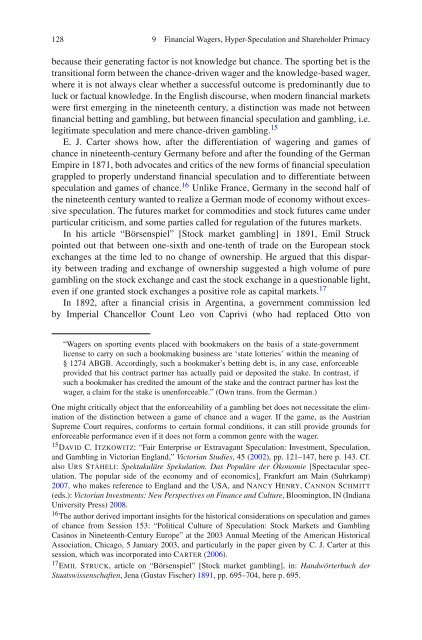The Ethics of Banking: Conclusions from the Financial Crisis (Issues ...
The Ethics of Banking: Conclusions from the Financial Crisis (Issues ...
The Ethics of Banking: Conclusions from the Financial Crisis (Issues ...
You also want an ePaper? Increase the reach of your titles
YUMPU automatically turns print PDFs into web optimized ePapers that Google loves.
128 9 <strong>Financial</strong> Wagers, Hyper-Speculation and Shareholder Primacy<br />
because <strong>the</strong>ir generating factor is not knowledge but chance. <strong>The</strong> sporting bet is <strong>the</strong><br />
transitional form between <strong>the</strong> chance-driven wager and <strong>the</strong> knowledge-based wager,<br />
where it is not always clear whe<strong>the</strong>r a successful outcome is predominantly due to<br />
luck or factual knowledge. In <strong>the</strong> English discourse, when modern financial markets<br />
were first emerging in <strong>the</strong> nineteenth century, a distinction was made not between<br />
financial betting and gambling, but between financial speculation and gambling, i.e.<br />
legitimate speculation and mere chance-driven gambling. 15<br />
E. J. Carter shows how, after <strong>the</strong> differentiation <strong>of</strong> wagering and games <strong>of</strong><br />
chance in nineteenth-century Germany before and after <strong>the</strong> founding <strong>of</strong> <strong>the</strong> German<br />
Empire in 1871, both advocates and critics <strong>of</strong> <strong>the</strong> new forms <strong>of</strong> financial speculation<br />
grappled to properly understand financial speculation and to differentiate between<br />
speculation and games <strong>of</strong> chance. 16 Unlike France, Germany in <strong>the</strong> second half <strong>of</strong><br />
<strong>the</strong> nineteenth century wanted to realize a German mode <strong>of</strong> economy without excessive<br />
speculation. <strong>The</strong> futures market for commodities and stock futures came under<br />
particular criticism, and some parties called for regulation <strong>of</strong> <strong>the</strong> futures markets.<br />
In his article “Börsenspiel” [Stock market gambling] in 1891, Emil Struck<br />
pointed out that between one-sixth and one-tenth <strong>of</strong> trade on <strong>the</strong> European stock<br />
exchanges at <strong>the</strong> time led to no change <strong>of</strong> ownership. He argued that this disparity<br />
between trading and exchange <strong>of</strong> ownership suggested a high volume <strong>of</strong> pure<br />
gambling on <strong>the</strong> stock exchange and cast <strong>the</strong> stock exchange in a questionable light,<br />
even if one granted stock exchanges a positive role as capital markets. 17<br />
In 1892, after a financial crisis in Argentina, a government commission led<br />
by Imperial Chancellor Count Leo von Caprivi (who had replaced Otto von<br />
“Wagers on sporting events placed with bookmakers on <strong>the</strong> basis <strong>of</strong> a state-government<br />
license to carry on such a bookmaking business are ‘state lotteries’ within <strong>the</strong> meaning <strong>of</strong><br />
§ 1274 ABGB. Accordingly, such a bookmaker’s betting debt is, in any case, enforceable<br />
provided that his contract partner has actually paid or deposited <strong>the</strong> stake. In contrast, if<br />
such a bookmaker has credited <strong>the</strong> amount <strong>of</strong> <strong>the</strong> stake and <strong>the</strong> contract partner has lost <strong>the</strong><br />
wager, a claim for <strong>the</strong> stake is unenforceable.” (Own trans. <strong>from</strong> <strong>the</strong> German.)<br />
One might critically object that <strong>the</strong> enforceability <strong>of</strong> a gambling bet does not necessitate <strong>the</strong> elimination<br />
<strong>of</strong> <strong>the</strong> distinction between a game <strong>of</strong> chance and a wager. If <strong>the</strong> game, as <strong>the</strong> Austrian<br />
Supreme Court requires, conforms to certain formal conditions, it can still provide grounds for<br />
enforceable performance even if it does not form a common genre with <strong>the</strong> wager.<br />
15 DAVID C. ITZKOWITZ: “Fair Enterprise or Extravagant Speculation: Investment, Speculation,<br />
and Gambling in Victorian England,” Victorian Studies, 45(2002), pp. 121–147, here p. 143. Cf.<br />
also URS STÄHELI: Spektakuläre Spekulation. Das Populäre der Ökonomie [Spectacular speculation.<br />
<strong>The</strong> popular side <strong>of</strong> <strong>the</strong> economy and <strong>of</strong> economics], Frankfurt am Main (Suhrkamp)<br />
2007, who makes reference to England and <strong>the</strong> USA, and NANCY HENRY, CANNON SCHMITT<br />
(eds.): Victorian Investments: New Perspectives on Finance and Culture, Bloomington, IN (Indiana<br />
University Press) 2008.<br />
16 <strong>The</strong> author derived important insights for <strong>the</strong> historical considerations on speculation and games<br />
<strong>of</strong> chance <strong>from</strong> Session 153: “Political Culture <strong>of</strong> Speculation: Stock Markets and Gambling<br />
Casinos in Nineteenth-Century Europe” at <strong>the</strong> 2003 Annual Meeting <strong>of</strong> <strong>the</strong> American Historical<br />
Association, Chicago, 5 January 2003, and particularly in <strong>the</strong> paper given by C. J. Carter at this<br />
session, which was incorporated into CARTER (2006).<br />
17 EMIL STRUCK, article on “Börsenspiel” [Stock market gambling], in: Handwörterbuch der<br />
Staatswissenschaften, Jena (Gustav Fischer) 1891, pp. 695–704, here p. 695.

















